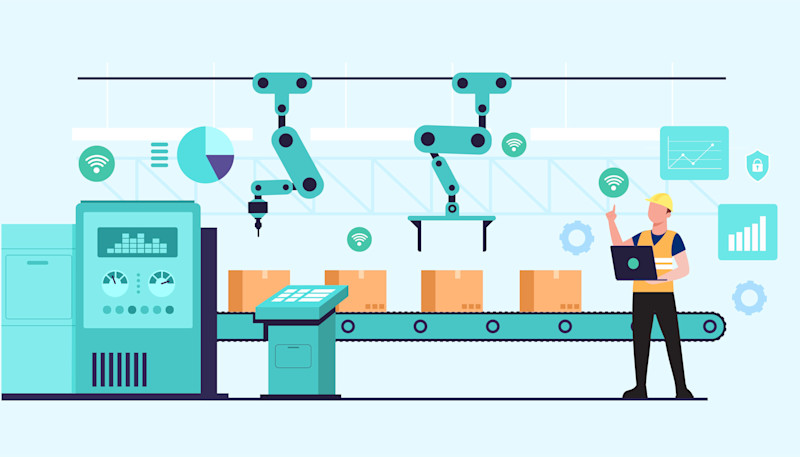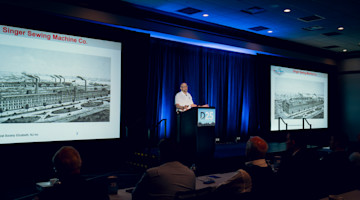TECHNOLOGY
See Data, See Energy
Energy consumption is ripe with opportunity for manufacturers. Applying the lean practices of identifying waste by using energy as a denominator will highlight a plant’s fascinating perspective. Ever wonder how much compressed air your shop wastes due to leaks? How about water usage for filtration? Don’t get me started on MQL! Shop visibility has grown beyond manufacturing equipment to encompass a holistic plant view, and harvesting data from manufacturing operations will maintain and improve the bottom line. Manufacturing consumes the second highest amount of energy only behind transportation. In the future, as manufacturers scramble to keep up with market fluctuations, energy efficiency will be the name of the game.
INTELLIGENCE
Alternative Energy Looking Sunny
Over the past two decades, global renewable energy consumption has surged, almost reaching 45.18 exajoules in 2022, according to Kearny and KPMG. Approximately half of this consumption is attributed to modern bioenergy, while the recent expansion of capacity is driven by solar photovoltaics. Despite this impressive, nearly 15-fold increase, renewable energy use still falls behind fossil fuels such as coal, oil, and gas. Nevertheless, as energy demand continues to grow, renewables are poised to capture a larger portion of the market. In line with this, incentivizing policies are expected to play a pivotal role in reducing upfront costs for the global adoption of alternative energy solutions. Looking at worldwide investment trends in 2022, solar PV received the most substantial funding at nearly $300 billion, followed by onshore wind with $140 billion and geothermal at approximately $180 million.
SMARTFORCE
Smartforce on the Horizon
Introducing the Smartforce Blog: Your source for news and announcements focused on the dynamic individuals and cutting-edge technologies driving the manufacturing technology workforce. Hear from the frontlines of education and workforce development as we highlight funding announcements, talent strategies, and inspiring stories from the K-12 robotics teams and STEM clubs that ignite inspiration across the nation. Visit us at IMTS.com/smartforce/ApprenticeBlog/articles.cfm.
Coming in October: In honor of National Disability Employment Awareness Month, we are proud to present a three-part article series to recognize the contributions and achievements of manufacturing professionals with disabilities and the innovative organizations that enable meaningful professional and professional growth opportunities. This series delivers a deeper understanding of diversity in the workplace and what a thriving work environment can look like in 2023 and beyond. Watch for these stories and more on the Smartforce blog on IMTS+.
ADVOCACY
Regulations From the Biden Agenda
Manufacturers are grappling with an onslaught of new and proposed regulations as the Biden administration seeks to advance its environment, trade, and social justice agenda. From toxic substances, such as PFAS and PIP (3:1), to labor rules, including overtime pay, to export controls of critical and emerging technologies, AMT is following developments to ascertain the impact on our members. It helps to share your stories of how a particular rule or regulation positively or negatively affects your business with your elected officials and with AMT at athomas@AMTonline.org. That data can persuade a regulatory agency that the cost is too great. In Congress, the REINS Act is a bill that would require any executive branch rule or regulation with an annual economic impact of $100 million or more to be designated as a “major rule” to come before Congress for an up-or-down vote before being enacted.
INTERNATIONAL
Sustainability Circles the Globe
The concept of sustainability is important when selling manufacturing technology internationally, particularly in Europe. The European market, more than most, places a strong emphasis on environmental responsibility, demanding eco-friendly solutions that reduce carbon footprints and resource consumption. Offering a product or service that facilitates adapting to these practices not only aligns with the local regulations and mindset but also enhances a company’s reputation and branding.
Sustainability-driven technologies generally lead to cost savings in the long run, which is a sales pitch in any language. Energy-efficient and waste-reducing systems translate into lower operating expenses and increased profitability for factories. Moreover, many European countries offer incentives and grants to businesses promoting sustainable manufacturing, creating additional financial benefits.
Sustainability is a prerequisite for future-proofing manufacturing businesses in a world increasingly focused on climate change and reduced environmental impact. If you have something to offer, let us know so we can help you penetrate the markets.
To read the rest of the Energy Issue of MT Magazine, click here.






